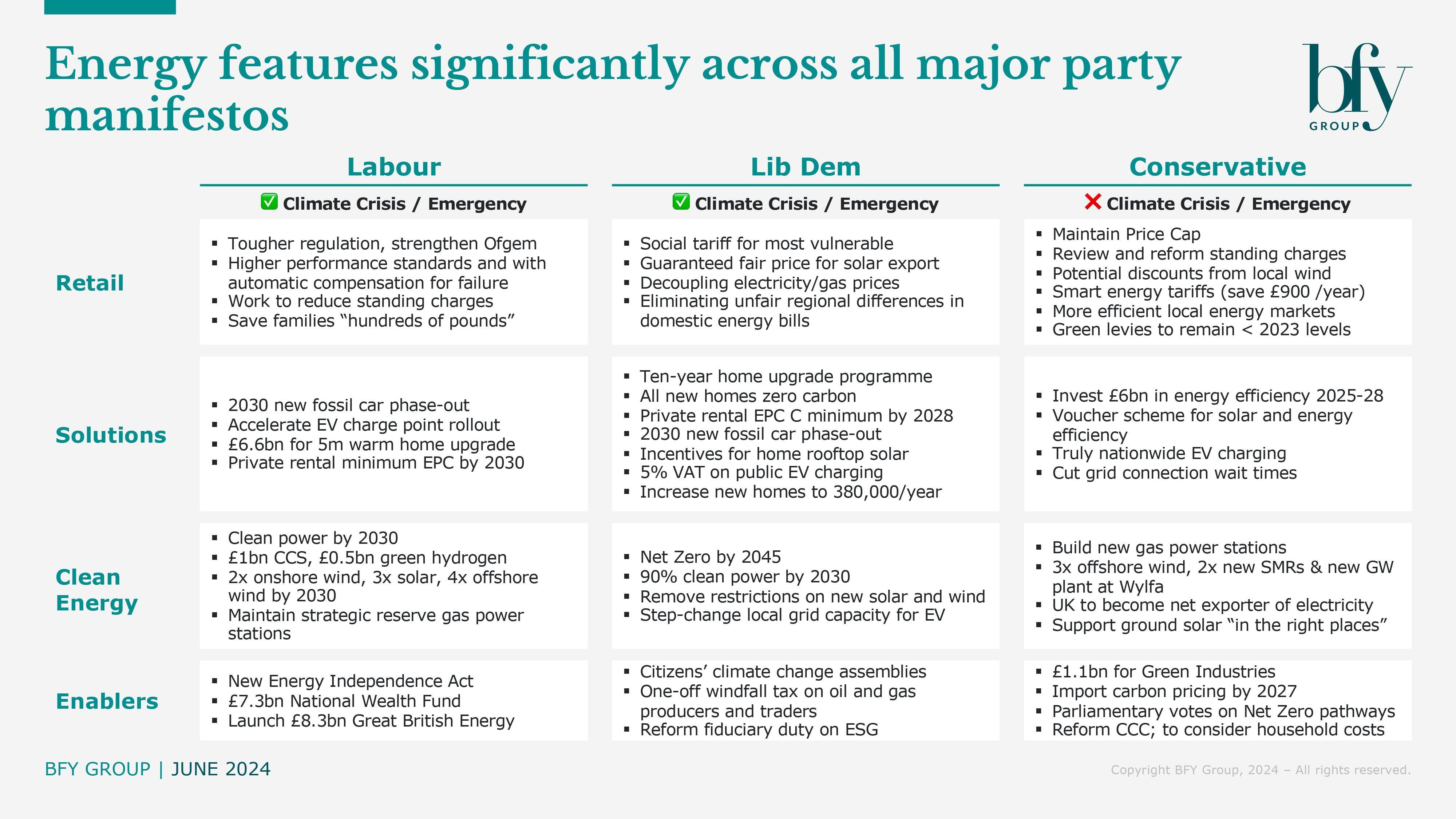Last week, all major political parties launched their manifestos for the 2024 general election, with energy featuring as a significant topic.
More market change is to be expected after election day, creating a new flavour of uncertainty for suppliers, at a time when Ofgem is already looking at potentially impactful changes to the Price Cap.
However, it’s important to approach this uncertainty with optimism. Regardless of which parties are voted into power, there are clear opportunities for suppliers to accelerate the integration of energy services and solutions – a journey that many have been actively progressing for some time.
Below, we’ve provided a summary of the key themes and commitments made in relation to energy, across all major party manifestos, outlining why now is the time for suppliers to embrace uncertainty.

What are the major parties proposing in relation to energy?
Liberal Democrats call for bold and urgent action to tackle climate change, targeting 90% clean power by 2030 and net zero by 2045. Their retail policies focus on introduction of a social tariff for the most vulnerable customers, decoupling the price of electricity from wholesale gas prices, and eliminating unfair regional differences in domestic energy bills.
Solutions include a ten-year emergency home upgrade programme, which would offer free insulation and heat pumps for low-income households, alongside incentives for home rooftop solar, and rapid expansion of EV charging points. Additionally, plans include ambition for all new homes to be zero-carbon, while also significantly increasing the rate of new homes to 380k per year.
Enablers include establishing a Net Zero Delivery Authority, citizens' climate change assemblies, and a one-off windfall tax on oil and gas producers and traders.
Conservatives focus on an "affordable and pragmatic transition to net zero", not explicitly referencing any climate crisis or emergency. Their retail strategy maintains the Price Cap, targets standing charge reform, and proposes smart energy tariffs – which they claim could save households up to £900 annually.
Solutions include a £6bn investment in energy efficiency between 2025 and 2028, and a voucher scheme for solar and energy efficiency. They plan to build new gas power stations, triple offshore wind capacity, construct 2 new small modular reactors (SMRs), and a new gigawatt plant at Wylfa.
Enablers involve £1.1bn for green industries, import carbon pricing by 2027, and parliamentary votes on net zero pathways.
Labour emphasises transforming Britain into a "clean energy superpower". Key retail strategies include tougher regulation of the energy market with a strengthened Ofgem, higher performance standards with automatic compensation for failures, and collaboration with Ofgem to reduce standing charges.
Notably, Labour focus more on customer protection in energy retail, over innovation enablers seen across the Conservative and Lib Dem manifestos, that reference localised pricing, smart tariffs, and decoupling gas/electricity pricing.
They plan to phase out new fossil fuel cars by 2030, accelerate the rollout of EV charging points, and invest £6.6bn to upgrade 5m homes with insulation and energy efficiency measures. Upstream, they aim to double onshore wind, triple solar, and quadruple offshore wind by 2030, maintaining strategic reserve gas power stations for energy security.
Labour’s Great British Energy is not a new energy supplier. It aims to be a renewable power company, headquartered in Scotland, partnering with energy companies, local authorities, and co-operatives to co-invest in technology, support capital-intensive projects, and deploy local energy production. It aims to utilise partnerships with market participants to install thousands of clean power projects, through a combination of onshore wind, solar, and hydropower.
Now is the time for energy suppliers to embrace uncertainty
While there has been a recovery in retail profitability in recent years, it has required significant transformation for suppliers. This includes migrating to new IT platforms and implementing new operating models, alongside continued investment in new capabilities across data, AI, processes, and people.
On the other side of this effort, regardless of the outcome of the general election, awaits Ofgem’s review of operating cost and debt allowances within the Price Cap. Their decision now looks likely to follow installation of a new Government with ambition to save families “hundreds of pounds”.
Operating as an energy supplier in recent years has been difficult, with limited short-term return. The exciting future, and reason to work hard to remain a trusted energy supplier in today’s market, has been to be there to support customers on their own paths to decarbonisation.
For our clients, the plans represent a new flavour of uncertainty. The energy crisis already cancelled, re-shaped, or delayed in-flight some key energy policies; with the focus rapidly shifting to market survival and stabilisation. As we approach the general election, there’s a real opportunity for some policy stability to gain traction for growth across several key areas.
At a very high level, all three manifestos broadly support the journey suppliers are actively making towards energy services and solutions. This has been the planned trajectory for several years, but we now see a greater drive to integrate energy supply and solutions businesses, developing more connected value propositions for customers. While emphasis of different plans raises some new uncertainty, closer integration of supply, services, and solutions continues to look like a no-regret move.
For more on how we can support you on this journey, or with the broader changes facing suppliers due to Ofgem’s Price Cap review, contact Tom Bromwich.
Matt Turner-Tait
Senior Manager
Matt lead clients through key strategic projects exploring growth opportunities, business models, competitive advantage, and mergers & acquisitions.
View Profile

